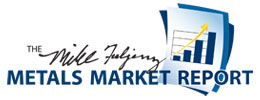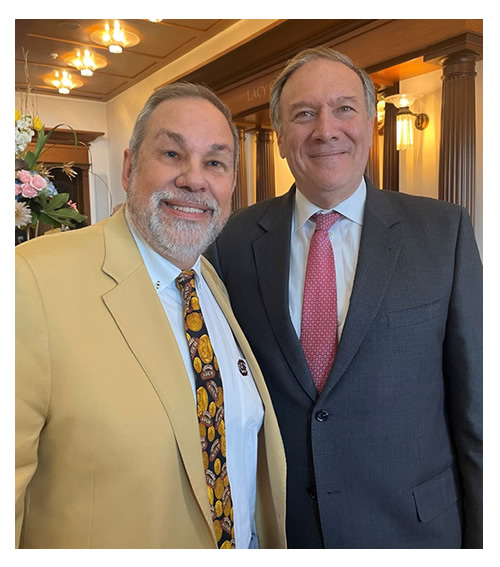Media Appearances
- New York Times
- The Wall Street Journal
- New York Times
- USA Today
- Bloomberg TV
- NRA News
- AMAC.us (Money Columnist)
- MoneyNews.com
(Insider Columnist) - Forbes
- NASDAQ
- NBC News
- CNBC
- Fox Business Network
- CBS Moneywatch
- SmartMoney (Personal Finance Magazine of Wall Street Journal)
- Kiplinger's
- Newsmax
What Others Are Saying
Ed Reiter, Executive Director,
June 2023 - Week 4 EditionGOLD and SILVER Recovering from SlideGold – and especially Silver – are recovering this week from their lows last week, based on a weaker dollar and some new global uncertainty following what appears to be a failed coup attempt in Russia over the weekend. Even though expert observers differ over the motivation and the outcome, it appears that an attempted coup d’état by the Wagner Group of particularly vicious terrorist armed forces working for Putin were disgruntled over the lack of financial support and sufficient arms, so they were challenging Putin’s rule in Russia, but their march on Moscow quickly fizzled out over the weekend. Still, Putin may have been weakened at home and on the war front, leading investors to turn more toward gold and silver. With gold and silver climbing, again, now is the time to contact one of our professional account representatives to ensure you are properly positioned with precious metals in your investment portfolio. Counterfeiting: The Largest Criminal Enterprise in the WorldWhile the world has its eyes on Ukraine and Russia, or the potential of a similar Chinese invasion of Taiwan, we in Beaumont, Texas have witnessed the June 8th raid of a boutique filled with Chinese counterfeit products. Although no rare gold or silver coins were found in this particular raid, Chinese counterfeits continue to impact legitimate businesses as well as potential buyers, who are unaware of how unsafe some of these fake goods can be. In this Beaumont raid, over $100,000 in name-brand merchandise was seized, including knockoffs of Gucci, Louis Vuitton, Hermes, Yves St. Laurent, Christian Dior and Versace products, to name just a few. According to Forbes, counterfeiting is now the largest criminal enterprise in the world, greater than illicit drugs or human trafficking. Counterfeiting was expected to reach $2.8 trillion in 2022, costing 5.4 million American jobs. And now, with social media growing in popularity, Facebook and Instagram have overtaken eBay and Amazon as the key marketplaces for selling counterfeit goods to the public. Coins have long been a favorite target for Chinese counterfeiters, so we undertook our own investigation. The award-winning article that highlighted our findings received honors from the Press Club of Southeast Texas. We Buy Fake Coins to Expose Counterfeiters – at Bargain Prices!Over the past two years, my associate Jerry Jordan, a nationally award-winning investigative reporter, has ordered numerous rare coins and bullion bars for educational purposes from several online shopping sites. These coins and bars, professing to be extremely rare and valuable finds, were all obvious fakes from counterfeit vendors, and many were priced very low! For instance, there was a “Credit Suisse 1-ounce Gold Bar” costing $2, plus $3 shipping. It would have been worth $1,500 when he ordered it, and nearly $1,900 today, but it’s essentially worthless because it was fake. Jerry also ordered an 1899 “Queen Morgan Silver Dolar” (sic) that would have graded XF (Extra Fine) and been worth $140—for just $3.89 shipping. The counterfeit coin was listed at no charge. And how about this “bargain,” a $10 Million Coin for $1.83! Jerry ordered a gold coin that would be worth $10 million or more if it were genuine: a 1933 Saint-Gaudens Double Eagle — but he bought it for just $1.83, plus $2 shipping. You can’t fault them for getting too greedy, can you? They choose extreme rarities and sell these knockoffs for a ridiculously low price. But none of these fake coins had the word “COPY” stamped on them, as is required by the updated 2014 U.S. Hobby Protection Law and that allows scammers an opportunity to sell these fake coins to dealers and collectors, who might not be as experienced in detecting counterfeits. To protect future investors, Jerry and I have forwarded these counterfeit items to the National Anti-Counterfeiting Task Force and its leader, Doug Davis, to help law enforcement find the perpetrators. China Fails to Deter CounterfeitingDespite assurances that they would crack down on counterfeit goods and intellectual property violations flowing from its country, the Chinese communist regime continues to reap billions from the sale of fake merchandise, and it’s now affecting areas of the U.S. economy that many wouldn’t suspect. One of those new areas would be impressive-looking fake driver’s licenses that come from China by the thousands and are easily available from multiple sites online. The ease of access allows young people not old enough to drink an opportunity to acquire alcohol or access other activities reserved for adults. It also gives scammers a way to change their identities to further their criminal enterprises. Some of the health dangers posed by counterfeit products include alarming amounts of heavy metals in health and beauty products. One lipstick had 751 times the amount of lead that Health Canada considered acceptable for cosmetics. As scientists have shown, lead affects a person’s cognitive ability, it has been shown to be especially dangerous for children. Counterfeit parts can also cause machinery to malfunction at high speed, which can cause serious injury or death. The Federal Aviation Administration (FAA) estimated that 520,000 counterfeit or unapproved aircraft parts are installed each year, and U.S. military aircraft are reportedly “riddled with counterfeit parts,” of which around 70% come from China. Experts interviewed by the Canadian Broadcast Company (CBC) were concerned not just about the health issues related to counterfeiting but about the funds being used for nefarious activity. Interpol states on its website that there is a clear link between illicit trade, human trafficking, drug trafficking, corruption, bribery, money laundering and counterfeit goods. Counterfeit precious metals sold by China have robbed many Americans of their life savings, which is an indirect health risk. In the past few years, I’ve reviewed several customers’ coin collections and, sadly, I have often detected one or more counterfeit coins within a collection. In one instance, the majority of one person’s collection consisted of counterfeit “proof” Buffalo one-ounce gold coins, with all coins appearing in what looked like genuine NGC holders. The holders themselves were fraudulent. In April 2021, U.S. Customs and Border Protection (CBP) officials seized $685,000 in counterfeit U.S. notes that all originated from China. The fake U.S. currency included $5, $10, $20, $50, $100 bills that were all turned over to the U.S. Department of Homeland Security and the U.S. Secret Service. Included in the overall total number of bills were 976 $100 bills headed to New York, according to the CBP. Even more egregious, during the first three months of 2021, officials seized over 100 shipments of counterfeit bills totaling $1.64 million from a single international mail sorting facility in Chicago. The CBP state, “From Jan 1 to March 31, (2021), officers seized 80 shipments of counterfeit currency, 24 shipments containing fake silver dollars and five shipments containing counterfeit foreign currency.” Millions of normal circulating U.S. coins, such as quarters and half dollars, as well as bullion and rare collectible coins, have now been counterfeited by Chinese perpetrators. Recently, U.S. law enforcement seized over $1 million dollars’ worth of counterfeit George Washington quarters, likely Made in China. Sadly, the NBA Lakers Promoted ‘Wish’It’s well known that the online sales platform “Wish,” which sources most products from China, was rife with counterfeits, yet the NBA’s Los Angeles Lakers accepted $36 million – less than LeBron James’ annual salary – to adorn the Lakers jerseys with a large “Wish” logo for a three-year period. This comes from a league that seemingly discourages players or executives from criticizing China for its humanitarian and labor practices or taking a stand against China’s authoritarian acts to usurp a democratic Hong Kong or mistreat the Uyghur community or resist Tibetan or Taiwanese independence. On March 2, 2020, H.R.6058 (dubbed the “Shop Safe Act of 2020”) was introduced in the House of Representatives. It would amend the “Trademark Act of 1946” to give certain e-commerce platforms contributory liability when counterfeits are sold that pose a health risk to consumers. The key phrase is “health risk,” which seems to shut coins and some other important products out of the equation, even though some fake coins and precious metals coming from China contain traces of cyanide.
Recently, I spoke with former U.S. Secretary of State, Mike Pompeo, about the surge of counterfeits coming from China. He said that during his tenure there was an increased emphasis on improving security at ports of entry, which helped with the problem. However, he and others I spoke with in law enforcement, agreed that, unfortunately, the current administration doesn’t seem to have the same priorities, which has resulted in the increase of fake goods that we are seeing in the United States. When you buy from us, you can be assured that your rare coins and gold, silver or platinum bullion are genuine. I am an expert in this field and even wrote the consumer alert guide for the Texas Attorney General on buying precious metals. Call us today. Dr. Mike Fuljenz is a former authenticator/grader with the American Numismatic Association (ANA) Certification Service and a member of the Professional Numismatists Guild (PNG) Anti-Counterfeiting Task Force.
Metals Market Report Archive >Important Disclosure Notification: All statements, opinions, pricing, and ideas herein are believed to be reliable, truthful and accurate to the best of the Publisher's knowledge at this time. They are not guaranteed in any way by anybody and are subject to change over time. The Publisher disclaims and is not liable for any claims or losses which may be incurred by third parties while relying on information published herein. Individuals should not look at this publication as giving finance or investment advice or information for their individual suitability. All readers are advised to independently verify all representations made herein or by its representatives for your individual suitability before making your investment or collecting decisions. Arbitration: This company strives to handle customer complaint issues directly with customer in an expeditious manner. In the event an amicable resolution cannot be reached, you agree to accept binding arbitration. Any dispute, controversy, claim or disagreement arising out of or relating to transactions between you and this company shall be resolved by binding arbitration pursuant to the Federal Arbitration Act and conducted in Beaumont, Jefferson County, Texas. It is understood that the parties waive any right to a jury trial. Judgment upon the award rendered by the Arbitrator may be entered in any court having jurisdiction thereof. Reproduction or quotation of this newsletter is prohibited without written permission of the Publisher. |





 The recent Beaumont raid is further proof that the proliferation of counterfeits, mostly from China, are a continuing problem, with far greater reach and impact than many realize. It also highlights the need for law enforcement and government agencies to get tougher on China over this proliferation of counterfeits.
The recent Beaumont raid is further proof that the proliferation of counterfeits, mostly from China, are a continuing problem, with far greater reach and impact than many realize. It also highlights the need for law enforcement and government agencies to get tougher on China over this proliferation of counterfeits.